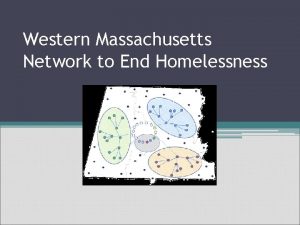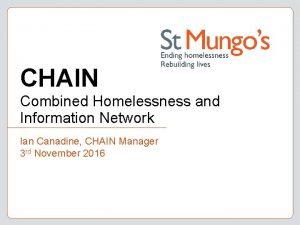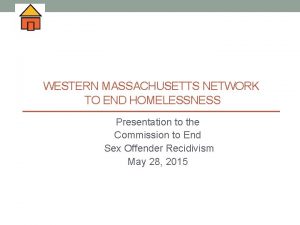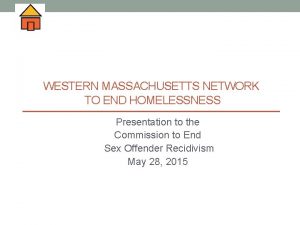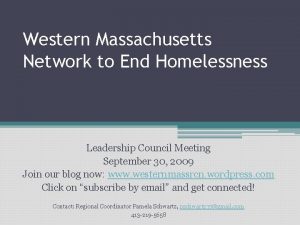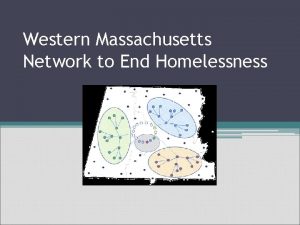WESTERN MASSACHUSETTS NETWORK TO END HOMELESSNESS Presentation to







- Slides: 7

WESTERN MASSACHUSETTS NETWORK TO END HOMELESSNESS Presentation to Acting Assistant Secretary Mark Greenberg July 29, 2015

The Western MA Network What: The Network creates collaborative solutions to end homelessness through a housing first approach that prioritizes prevention, rapid re-housing and housing stabilization Where: Serves all four Western counties, from Springfield to Pittsfield and dozens of rural communities in between Who: Over 200 participating partners, including: • Senate President Stan Rosenberg and other Western MA legislators • 7 Western MA mayors and town managers • Faith leaders • Bank and other business leaders • Community college presidents and staff • Regional employment boards and career centers • Housing, child care, and health care providers

Successes • The development of a robust Western MA Network • July, 2015: Release of the Western MA Opening Doors Plan to End Homelessness, the data-driven framework for preventing and ending all types of homelessness in the region • The Secure Jobs Program, providing employment and housing stability for over 200 families

Ending Family Homelessness Where we are: The number of families experiencing homelessness in the region has been rising 1000 909 Families Experiencing Homelessness in Western MA 900 786 756 800 702 700 631 560 600 500 400 300 200 100 71 84 122 0 3 County Hampden County 2013 2014 Western MA 2015 Where we need to go: HUD Performance Measures such as Reducing the Length of Homelessness How we get there: Implement resource allocation strategies that focus on outcomes towards making homelessness rare, brief, and non-recurring. Complete and accurate data will promote a better understanding of barriers and point towards solutions

Lessons Learned & Challenges Ahead • Collaboration and collective impact work are cornerstones to system change • Accessible, quality data is necessary to make change happen • Wraparound case management results in stable housing and employment • The systems of care that a family, or a person in a family, may access do not currently “speak” to each other • Each system of care must adhere to normalized data standards • Continued investment and flexible funds are critical to meeting family barriers, e. g. , transportation or child care, as they arise

Recommendations/Action Steps • Provide support, oversight and accountability to ensure that the State’s Emergency Assistance program adheres to Federal data collection and reporting requirements and full compliance with the Homeless Management Information System • Provide mechanisms and support to address privacy concerns when sharing data • Encourage software vendors to adopt a "Service-Oriented Architecture" (SOA) that enables systems to speak with one another. More details on this can be found here or at https: //goo. gl/Zbcm. HX. • Implement tools and practices to ensure the data being used for performance measures is both complete and accurate • Support coordinated “network” approach to system change across regions

For Further Information Contact: Pamela Schwartz, Director Western Massachusetts Network to End Homelessness 413 -219 -5658 pschwartz 77@gmail. com http: //westernmasshousingfirst. org
